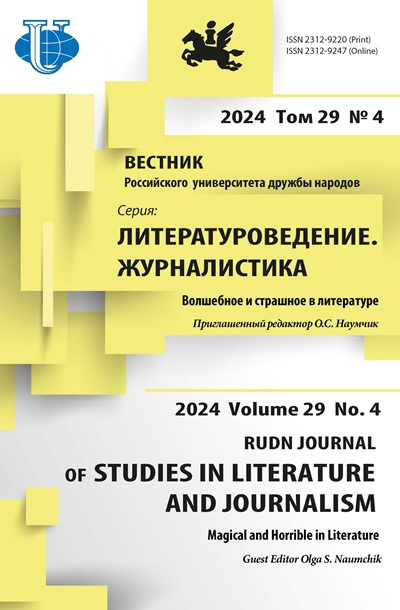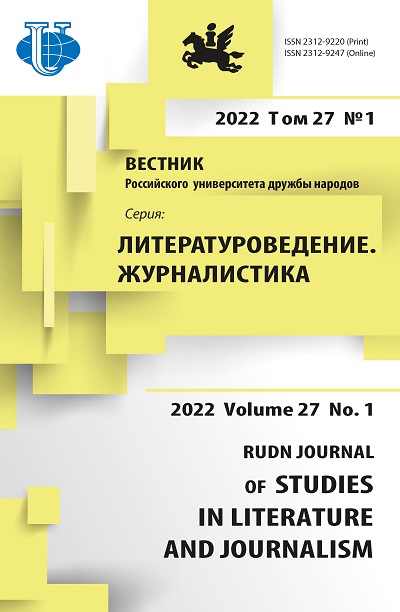News Media Trust and Sources of Political Information in West Africa: Mainstream vs. New Media in Ghana and Nigeria
- Authors: Mustapha J.M.1, Shilina M.G.2,3, Agyei O.S.1, Ocansey C.R.4
-
Affiliations:
- Peoples’ Friendship University of Russia (RUDN University)
- Plekhanov Russian University of Economics
- Lomonosov Moscow State University
- University for Professional Studies
- Issue: Vol 27, No 1 (2022)
- Pages: 200-208
- Section: JOURNALISM
- URL: https://journals.rudn.ru/literary-criticism/article/view/30733
- DOI: https://doi.org/10.22363/2312-9220-2022-27-1-200-208
Cite item
Full Text
Abstract
Like many other developed democracies, most democratic countries in West Africa are facing challenges of trust in news media for political information, particularly with the emergence of the non-mainstream media - new social media. Previous research revealed that alternative news media trust is correlated with lower levels of trust in news in Africa and that the presence of private media have failed to offer alternative sources to government media. This paper for the first time seeks to investigate reasons for the increase in distrust in news media among the mainstream and non-mainstream media in West African Ghana and Nigeria, which is the main source for political information in the region. We conducted the study through online surveys for the audience of news media in Ghana and Nigeria who are interested in political news and are frequent users of both mainstream media and new social media for political information. We found out that even though people in these two countries use social media as an alternative source of obtaining political information, yet, they largely still trust mainstream media news for political information rather than social media.
About the authors
Jamiu M. Mustapha
Peoples’ Friendship University of Russia (RUDN University)
Email: mustafa-md@rudn.ru
ORCID iD: 0000-0001-8239-5808
Lecturer of the Department of Mass Communication, Philological Faculty
10 Miklukho-Maklaya St, bld 2, Moscow, 117198, Russian FederationMarina G. Shilina
Plekhanov Russian University of Economics; Lomonosov Moscow State University
Email: marina.shilina@gmail.com
ORCID iD: 0000-0002-9608-352X
Professor
36 Stremyanny Ln, Moscow, 115093, Russian Federation; 9 Mokhovaya St, Moscow, 125009, Russian FederationObiri S. Agyei
Peoples’ Friendship University of Russia (RUDN University)
Email: stephenobiri99@gmail.com
ORCID iD: 0000-0002-7409-7584
PhD Candidate of the Department of Psychology and Pedagogy
10 Miklukho-Maklaya St, bld 2, Moscow, 117198, Russian FederationCarbukie R. Ocansey
University for Professional Studies
Author for correspondence.
Email: ruth.ocansey@upsamail.edu.gh
ORCID iD: 0000-0001-9740-8894
Lecturer at Department of Communication Studies
Accra (UPSA), New Rd, Madina, GhanaReferences
- Andrade, C. (2020). The Limitations of Online Surveys. Indian Journal of Psychological Medicine, 42(6), 575-576.
- Ardèvol-Abreu, A., & Gil De Zúñiga, H. (2017). Effects of editorial media bias perception and media trust on the use of traditional, citizen, and social media news. Journalism & Mass Communication Quarterly, 94(3), 703-724.
- Creswell, J.W. (2014). Research Design: Qualitative, Quantitative and Mixed Methods Approaches (4th ed.). Thousand Oaks, CA: Sage.
- Goode, L. (2009). Social news, citizen journalism and democracy. New media & society, 11(8), 1287-1305.
- Heinecke, S. (2019). The Game of Trust: Reflections on Truth and Trust in a Shifting Media Ecosystem. In Media Trust in a Digital World (pp. 3-13). Cham: Springer.
- Kalogeropoulos, A., Suiter, J., Udris, L., & Eisenegger, M. (2019). News Media Trust and News Consumption: Factors Related to Trust in News in 35 Countries. International Journal of Communication, 13(22), 3672-3693.
- Kim, D. H., Jones-Jang, S.M., & Kenski, K. (2020). Why Do People Share Political Information on Social Media? Digital Journalism, 2, 1-18.
- Kohring, M., & Matthes, J. (2007). Trust in news media: Development and validation of a multidimensional scale. Communication Research, 34(2), 231-252.
- Livingstone, S., & Markham, T. (2008). The contribution of media consumption to civic participation. The British journal of sociology, 59(2), 351-371.
- Moehler, D.C., & Singh, N. (2011). Whose news do you trust? Explaining trust in private versus public media in Africa. Political Research Quarterly, 64(2), 276-292.
- Newman, N., Fletcher, R., Kalogeropoulos, A., & Nielsen, R. (2019). Reuters institute digital news report 2019 (Vol. 2019). Reuters Institute for the Study of Journalism.
- Osei-Appiah, S. (2019). News Media Logic and Democracy: Strange Bedfellows in Political News-making Practices of Private Radio Stations in Ghana. African Journalism Studies, 40(3), 57-72.
- Otto, K., & Köhler, A. (Eds.). (2018). Trust in media and journalism: Empirical perspectives on ethics, norms, impacts and populism in Europe. Springer.
- Park, S., Fisher, C., Flew, T., & Dulleck, U. (2020). Global mistrust in news: The impact of social media on trust. International Journal on Media Management, 1-14.
- Pingree, R.J., Quenette, A.M., Tchernev, J.M., & Dickinson, T. (2013). Effects of media criticism on gatekeeping trust and implications for agenda-setting. Journal of Communication, 63(2), 351-372.
- Rice, S., Winter, S.R., Doherty, S., & Milner, M. (2017). Advantages and disadvantages of using internet-based survey methods in aviation-related research. Journal of Aviation Technology and Engineering, 7(1), article 5.
- Sterrett, D., Malato, D., Benz, J., Kantor, L., Tompson, T., Rosenstiel, T., Sonderman, J. & Loker, K. (2019). Who shared it?: Deciding what news to trust on social media. Digital Journalism, 7(6), 783-801.
- Tsfati, Y., & Ariely, G. (2014). Individual and contextual correlates of trust in media across 44 countries. Communication Research, 41(6), 760-782.
- Williams, A.E. (2012). Trust or bust?: Questioning the relationship between media trust and news attention. Journal of Broadcasting & Electronic Media, 56(1), 116-131
















